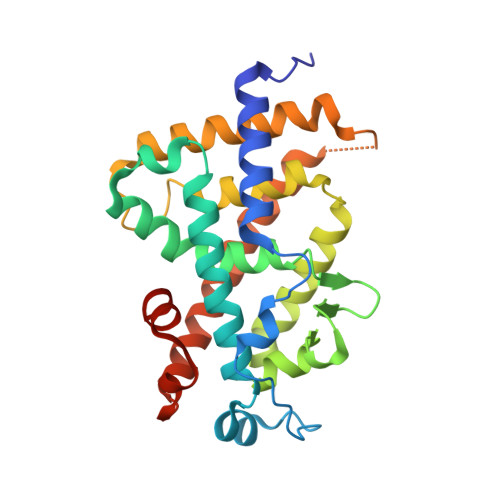Crystal structures of the vitamin D receptor complexed to superagonist 20-epi ligands.
Tocchini-Valentini, G., Rochel, N., Wurtz, J.M., Mitschler, A., Moras, D.(2001) Proc Natl Acad Sci U S A 98: 5491-5496
- PubMed: 11344298
- DOI: https://doi.org/10.1073/pnas.091018698
- Primary Citation of Related Structures:
1IE8, 1IE9 - PubMed Abstract:
The crystal structures of the ligand-binding domain (LBD) of the vitamin D receptor complexed to 1alpha,25(OH)(2)D(3) and the 20-epi analogs, MC1288 and KH1060, show that the protein conformation is identical, conferring a general character to the observation first made for retinoic acid receptor (RAR) that, for a given LBD, the agonist conformation is unique, the ligands adapting to the binding pocket. In all complexes, the A- to D-ring moieties of the ligands adopt the same conformation and form identical contacts with the protein. Differences are observed only for the 17beta-aliphatic chains that adapt their conformation to anchor the 25-hydroxyl group to His-305 and His-397. The inverted geometry of the C20 methyl group induces different paths of the aliphatic chains. The ligands exhibit a low-energy conformation for MC1288 and a more strained conformation for the two others. KH1060 compensates this energy cost by additional contacts. Based on the present data, the explanation of the superagonist effect is to be found in higher stability and longer half-life of the active complex, thereby excluding different conformations of the ligand binding domain.
Organizational Affiliation:
Laboratoire de Biologie et Génomique Structurales, Institut de Génétique et de Biologie Moléculaire et Cellulaire, Centre National de la Recherche Scientifique/Institut National de la Santé et de la Recherche Médicale/Université Louis Pasteur, France.















